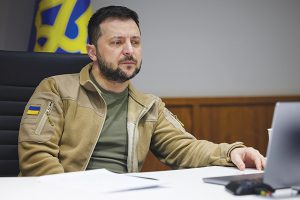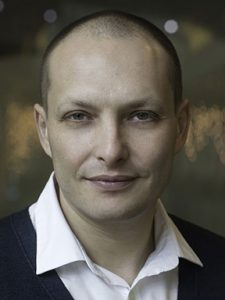It may still be hard to believe, despite all the Russian military bungling, that Ukraine can win the war against its much bigger neighbour. Yet, as the underdog, Ukraine actually has more scenarios in which it can credibly declare victory. If it survives as an independent state — which appears almost certain now that Vladimir Putin has had to scale down his military goals — it will already be victorious in the world’s eyes, having held its own against one of the great military powers, and done so without any allies willing to send their troops into battle.
This prospect has led Ukrainian intellectuals to start speculating about the country’s shape and direction after a victory. As Russian propagandists attempt grimly to normalise the idea of a nuclear war and rosy depictions of a victorious “Russian world†have faded even from nationalist narratives, Ukrainians are looking forward to playing a bigger global role as the nation that managed to thwart and humiliate the mighty bear next door.
To what extent these hopes and dreams can come true depends on Ukraine’s Western allies as much as on Ukrainians themselves. If they fail to combine their efforts in a productive way, a scenario in which both Russia and Ukraine end up losing the war is conceivable.
Ukrainians wouldn’t be true to themselves if they didn’t aim high. In a recent Telegram post, Oleksiy Arestovich, the advisor to President Volodymyr Zelenskiy who predicted the timing and character of the Russian invasion as early as 2019, described a victorious Ukraine as an “undisputed regional leader†of Eastern Europe — “if we work skillfully,†he qualified the bold vision.
“By 2028-2035 we’ll have a completely different geopolitical landscape in the Berlin — Constantinople — Kazan triangle,†Arestovich wrote, calling Istanbul by its Byzantine name. “Kyiv will be star shining in its center. Ukrainians lost a lot as they lived their illusions before 2014. Now, having sobered up, they’re winning back what they gave up in the last 300, 500, 1,000 years.â€
The historical references are a natural answer to Putin’s justification of his aggression, also rooted in a certain reading of history. They continue the thread of Ukrainian thought that describes Ukrainians as a historically democracy-based and democracy-seeking polity and Russians as eternal subjects and slaves to all kinds of tyrants. What’s new here is a claim to a new centrality: Ukraine, for centuries a provincial backwater, now feels it has earned, or is earning on the battlefield, the status of a thought leader, a flag-bearer for Europe’s east and center.
“I believe that Ukraine will become the new Central European tiger,†historian Yaroslav Hrytsak said in a recent interview.
“It will become a leader in the greater Baltic and Black Sea region. I think no nation other than Poland will be able to match its influence and status… War is a great catastrophe. But at the same time, it creates great opportunities and
enables the previously impossible.â€
Some of the optimistic visions for the future go even further, extending Ukraine’s role to that of a co-founder of a new “League of Nations†to replace the United Nations, which has proved unable to strip Russia of its oversize role in global security affairs.
Despite what Ukrainians see as their historical, almost genetic thirst for democracy, Ukraine won’t play its new prominent role as a beacon of liberalism. Zelenskiy predicted last month that post-war Ukraine would be more like Israel than the relaxed, complacent nations of the European Union.
This Ukraine, if indeed it rises to the prominence to which its intellectual elite considers it entitled, is likely to be a thorn in the side of Old Europe; the Poland of Law and Justice, the nation’s nationalist ruling party, would be its closest ally. It would be no passive recipient of EU rules and dictates, and it might even harbor some ambitions to redraw the region’s security architecture: Zelenskiy has already proposed a new military alliance that would operate parallel to Nato. He called it U24, referring to a goal of 24-hour response to any external threat.
That’s a politically difficult target for established European democracies, but a clear indication of the kind of country Ukraine would like to be: One that is prepared to repel threats at a moment’s notice.
The window of opportunity Ukraine is about to get by denying Putin most of its territory is perhaps the biggest the country has seen since independence. At the same time, however, both Ukrainians and their allies will need to work hard to keep it from closing as the previous ones did. On the Western side, this means giving up the usual bean-counting and truly going out of the way to reward Ukrainians’ heroism — and on the Ukrainian side, perhaps a certain tempering of both the newfound leadership ambitions and the ancient urge to grab the money and run. It will have to be a collaborative effort based on a shared sense of purpose. Lacking that, Ukraine could end up a loser despite holding out against all odds. That shouldn’t be allowed to happen.
—Bloomberg
Leonid Bershidsky is a member of the Bloomberg News Automation team based in Berlin. He was previously Bloomberg Opinion’s Europe columnist. He recently authored a Russian translation of George Orwell’s “1984â€
 The Gulf Time Newspaper One of the finest business newspapers in the UAE brought to you by our professional writers and editors.
The Gulf Time Newspaper One of the finest business newspapers in the UAE brought to you by our professional writers and editors.

